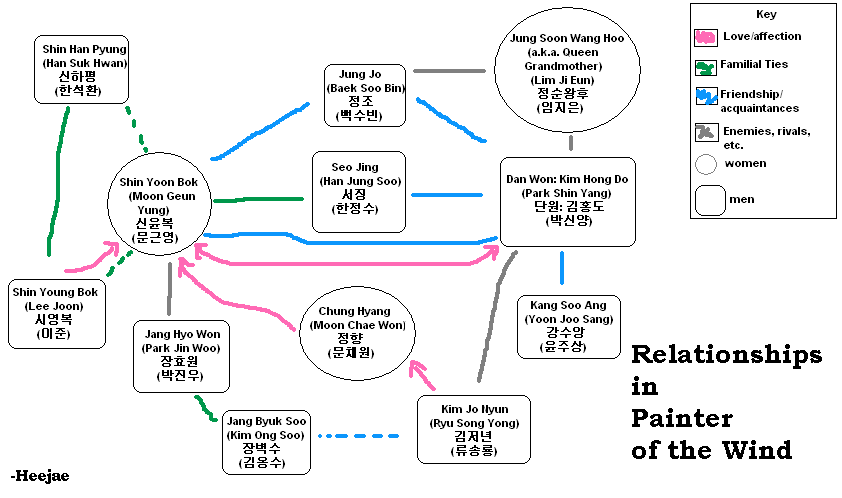Source: javabeansTake two: Painter of the Wind, Episode 1October 3rd, 2008 // by heejae[In addition to Dahee's recaps, reader heejae volunteered to share her initial thoughts on the drama Painter of the Wind, and I figure the more (opinions) the merrier. For another perspective and some more detailed thoughts on the drama, please take a look at what heejae has to say. Thanks! -javabeans]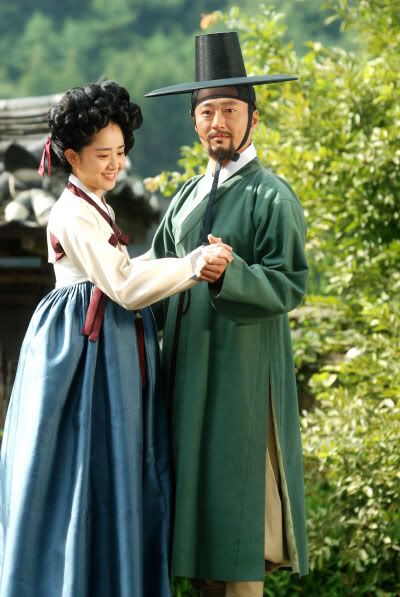
This series got off to a great start. Subtleties are a big part of this series, and so is showing-not-telling; the audience is left to infer about many things often. I may talk about it in this re-cap as though it were the next coming of television or whatnot, but I don’t intend to make those kinds of statements ^^;
In this commentary I will:
* Give commentaries/insights about this episode.
* List pro’s and con’s for anyone who might be iffy as to whether or not they’re up to watching this series.
* …as well as opinions/possible gushing *laughs*
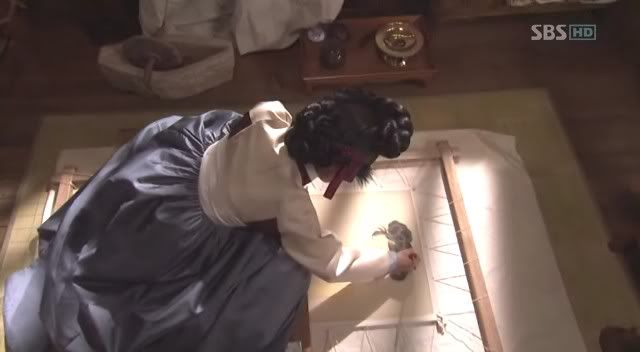 Part 1: Bitter Beginnings, Bitter Endings
Part 1: Bitter Beginnings, Bitter EndingsThe episode opens with Park Shin Yang dressed in yellow robes, walking up a mountain. The mountain is very scenic and beautiful, contrasting the sad music that’s being played in the background.
Park’s voice-over tells us:
“Now, I’m going to talk about one person…I am, right now, joyful and yet sorrowful at the same time. To see that person [her] I’m happy, but to lose that person [her] I’m sorrowful. That person was my student, my mentor, my friend, and… my beloved.”
(I can practically hear the gurgling of many, many fans already at the word beloved *laughs*)
Park walks into a hut, and we finally learn what his destination is; it’s where Moon Geun Yung used to paint. He sees a painting that she did (a self-portrait if I’m not mistaken) and he begins to cry bitterly over it.
The execution and cinematography here is subtle, really beautiful, and I really liked it. Park is basically explaining how their (his and Moon Geun Yung’s) relationship will bloom, and this sets the drama apart from many-a-sageuk plot that we’ve all seen before. The young king is born, he faces challenges in childhood (a.k.a. one of his father/predecessor’s wives trying to throw him off the track of being next in line for the throne), and he meets his forbidden-beloved, comes into power, marries a few women, and then rules while trying not to get assassinated. After that, he dies, and the end. *snores* We don’t want another Yi San or Hae Shin-esque sageuk do we?
From the very first episode, the first five minutes in fact, we see that this drama is going to be made of relationships, not politics (which is good, because I can never understand Joseon political lingo anyhow). This isn’t to say that there won’t be any politics at all, because no matter what, all period pieces have to do with some form of a hierarchy, and in the history of Korea, the government was a huge part of this hierarchy; and this drama begins in the palace, where the King’s painters paint to keep records of the country. Their responsibility as painters of the kingdom was to keep a record of this country; it’s very comparable to newspaper reporters, I suppose.
And also, we see that the age gap is being taken into play; I suppose that such an age gap between a married couple or lovers wasn’t as uncommon of an occurrence as it is today, look at the kings…the really old guys who play the king’s grandfather.
The cinematography right here was very nice and it created a dramatic statement: this isn’t a happy story. Continuing along, we see Moon Geun Yung dressed in both men and women’s hanbok (traditional Korean wear) as she paints her self-portrait, but as soon as Park Shin Yang says “my beloved” her attire changes from standard men’s hanbok to the hanbok that she’s wearing in her self-portrait. Those few seconds captured my attention from the start, and I said, “Ily, production team, so so much.”
After he finishes talking, Park opens the door, which Moon turns to, as if looking at him. But now we see that she is in the past, and he the present. The change is obvious, but it doesn’t scream at you; there are no neon lights pointing at the change. Sometimes, scenes are so poorly captured, or it is obvious that a certain effect was meant to be achieved, yet failed. You understand the intent well without confusion.
* The cinematography had me at hello.
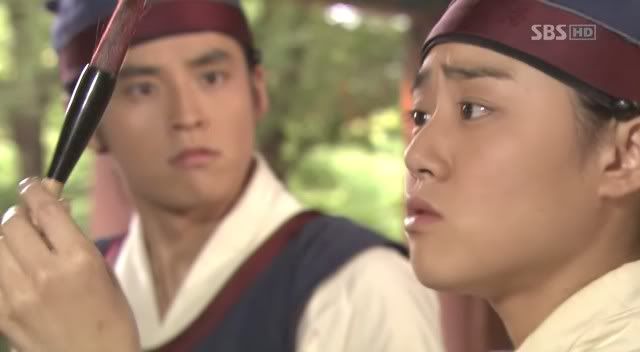 Part 2: Race: Shin Yoon Bok vs. Jang Hyo Won!/Leisurely Art Days
Part 2: Race: Shin Yoon Bok vs. Jang Hyo Won!/Leisurely Art DaysWell done, Moon Geun Yung. I commend thee. She does a great job with her mannerisms, speech, and voice. She even has the physical aspects of male-kind down; look at her facial expressions and body movements. Best of it all, it doesn’t feel acted, but natural. She does gender-bent actresses across the screen proud.
It always piques my interest when I hear of actors and actresses giving up vanity for their art, and Moon Geun Yung, by far, takes the cake for giving up vanity. She honestly looks like a guy here, and watching episodes that are farther along, you really get that feeling that, “Wow, this actress is really giving up looking pretty to convey real emotions.” When I first heard that Moon Geun Yung was doing that, I kind of did a double-take; Korea’s Little Sister cross-dressing on the small screen? I was very hesitant to watch it, but it did better than expectations. Well, Korea’s Little Sister no more!
Back to the characters themselves. Here, and all throughout the first couple episodes, Yoon Bok does seem like a cocky little ass, but I like this cocky act that she has as a front. It’s not narcissistic, but it’s very cocky. She continues to carry it throughout the episode when dealing with people that she feels warrants that kind of behavior: people who try to demean her or step on her. She’s called “기집애 같은놈” meaning in short “Girly-boy” or “Wuss” by her fellow classmates at the doh-hwa-suh. But it’s (her cocky attitude) really endearing and I love it. It’s a very guyish sort of cockiness, and she’s just trying to be one of the guys after all, is she not?
Yoon Bok: “Three, two–”
Hyo Won: “H-hey!”
Yoon Bok: “-one.”
Hyo Won: “Hyung-nim.”
Yoon Bok: “Well, well!”
Hyo Won: *looks up*
Yoon Bok: “You’re late. I’ll use it well.”
Park Jin Woo does his part well too, but I’m not sure how I feel about his acting. I think it feels too much like acting, and not as natural. It’s interesting that the two of them (Moon Geun Yung and Park Jin Woo) have done acting together before in My Little Bride with Kim Rae Won. Their rivalry seems real and genuine; it’s fun to watch their banter, nonetheless, despite Park Jin Woo’s exaggerated manner in the beginning of the episode.
FYI: The time period of this story is the Joseon Era, as most sageuks tend to be. Other ones of this time include Yi San and Hong Gil Dong. Remember, this is in the past to Kim Ho Dong’s (Park Shin Yang’s) story that he’s “telling” us.
The outdoor art lesson is called weh-yoo-sah-seng. That’s actually what the episode is called in the credits. It’s a day in which they can go outside to paint whatever they please… or so they think.
* I was hesitant to see what Moon Geun Yung would bring to the table, but she has won me over with the first ten minutes of the thing. Maybe I’m just too easy. *laughs* I actually might like this better than Yoon Eun Hye’s transformation for Coffee Prince.
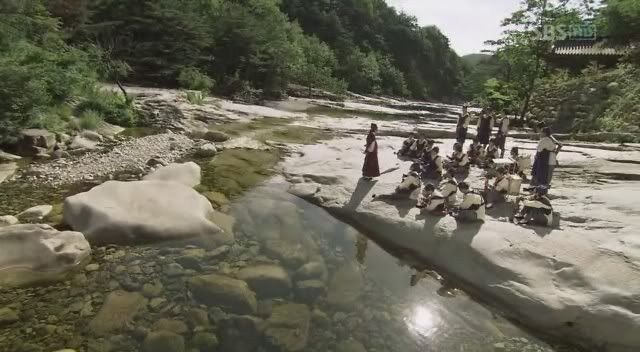
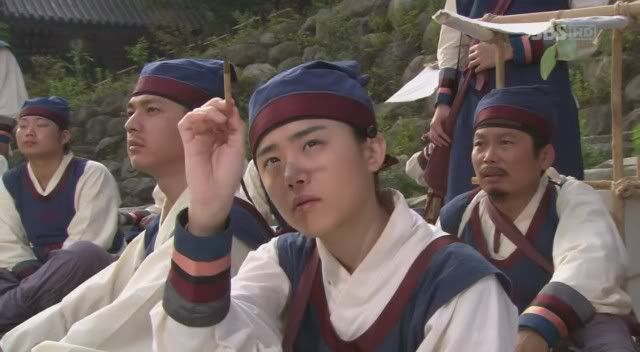 Part 3: Weh-Yoo-Sah-Seng, and the Adventures of Yoon Bok
Part 3: Weh-Yoo-Sah-Seng, and the Adventures of Yoon BokOh, Moon Geun Yung, you and your funny little ways. She does a nice job of being a man, yes yes?
Now, for explanation on the whole “brother” and “father” deal. Yoon Bok is supposed to be a noble’s daughter (case in point: Il-Jeh Elder, played by Han Suk Hwan, who happened to be in Hong Gil Dong as well). She has given up being a woman on the outside and is posing as a boy in order to be eligible to take the Painter’s Exam to paint within the King’s palace. Her “brother” and “father” know about her true identity, as it is implied, and that is why her brother looks after her so much. Actually, when her father was explaining to her “brother” Young Bok, he was telling him that Yoon Bok is special for she is going to be painting under the King himself, and she’s going to be recording royal events in the paintings. (Actually, I’m going to post a chart of relationships that I found online; it’ll be at the end of this entry).
The relationship between Yoon Bok and the gi-saeng, Chung Hyang, is interesting, as she is taken by her beauty instantly, but it doesn’t seem to be an attraction as much as she’s entranced. It’s got to be rough to look at the same people, guys, all day everyday. It’s like a “man-crush” if you will, only in reverse terms. I don’t like Moon Chae Won (a.k.a. Chung Hyang)’s acting (more on that later).
Little things that I noticed were that while Yoon Bok’s painting the air, there are actual brush strokes showing up in the sky line and along the mountains. This is the way that Yoon Bok looks at the world, as a canvas to paint what she wants to. It’s a very little subtlety that’s very fitting and really cute. It shows how much work is put into even the little details.
Also, I noticed after Yoon Bok drives Young Bok (her brother) away from her during the weh-yoo-sah-seng that there is a lone butterfly sitting atop a flower. Very symbolic of what’s to come in the near future for Yoon Bok, as she meets Chung Hyang, whom she calls a flower.
* The actors all look the part, now can they please all play the part?
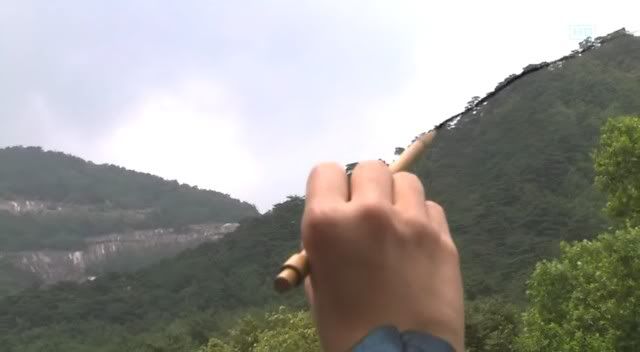 Part 4: Trouble in Paradise
Part 4: Trouble in ParadiseYoon Bok’s painting was drawn with the Queen Grandmother facing away from the audience, red birthmark and all. The birthmark is the big arrow pointing towards the fact that the woman in this picture is indeed the Queen Grandmother. The scene in which the Queen Grandmother and her lady-in-waiting are discussing the capture of that incriminating painting ends with her facing away, in the same pose as Yoon Bok’s painting.
The Queen Grandmother is so desperate to get that painting out of sight because it is very obvious to anyone who’s paying attention. If one truly knew her, or saw her often, and paid close attention to the painting, it would be very obvious as to who that woman was. She’s holding a man’s hat and heavy implications along with it. This makes her moral character very questionable and suspicious, so she tries to do whatever she can to save face. She even makes up petty lies, which the king sees right through.
The King and the Queen Grandmother have a very cold and fake relationship hidden behind smiles that don’t reach their eyes. It’s delicate and like many political sageuks, only thing is that these attacks are personal, as the King questions his grandmother’s moral conduct many-a-time. She even goes as far as to ask him, “Are you accusing me?” and he always answers with a polite smile, “Of course not.”
Yoon Bok’s adoptive father: the Il Jeh Elder knows that Yoon Bok has painted the painting of the Queen Grandmother. When she tries to speak up and confess, he ignores her, both times. He hopes that the Dan Won: Kim Hong Do won’t figure it out. Dan Won/Kim Hong Do is a legendary figure in the world of painting. The cream of the crop, if you will. Everyone in Joseon Korea wants his pricey paintings.
The cinematography during the King and the Queen Grandmother’s conversation outside is very nice as well. The King just relays the information that the Dan Won is going to come to examine the painting, and her heart skips a beat, before the world spins around, closing in on her face. This here, is a good example of showing without telling. The camera circles around the King’s face, for that is what is the center of the Queen Grandmother’s world at that moment, and everything is thrown into a frenzy.
* There’s no need for Joseon Korean Politics 101, as it’s not too difficult to understand the current situation.
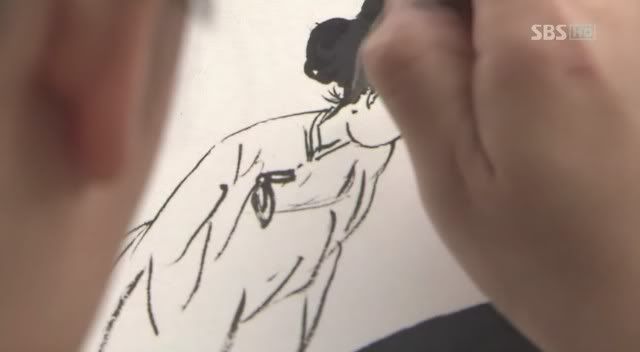 The Dan Won: Kim Hong Do meets Shin Yoon Bok!
The Dan Won: Kim Hong Do meets Shin Yoon Bok!Man oh man, it’s Park Shin Yang. *laughs* He’s an ahjoommah magnet, granted, but he’s got great personality and a sense of quirkiness, and I like him a lot as an actor because of that. He brings life to a character that could be stuffy, grey, or God forbid sage-like. (Now that would make me think twice about supporting the romance of Hong Do and Yoon Bok; I have no intentions of promoting pedo-bear sages).
Park Shin Yang himself said that Painter of the Wind isn’t a sageuk, that’s because you look at his other works, and you look at this work, and it’s still him. I love his mannerisms and speech (so easy to understand T^T) and his informal air. (I’m going to call him Dan Won and Hong Do alternately).
His chemistry with Moon Geun Yung takes the cake. They have a hate…hate relationship so far into the episode. It’s fun to watch their characters interact, as it’s easy and natural, very casual. Actually, the situation that they’re in is a very, very cliché k-drama situation, is it not? Guy meets girl, girl hates guy, guy and girl hate one another. Guy and girl begin to see each other’s “real” personalities, guy and girl fall for each other; it’s an age old equation for many k-dramas. Yet, it doesn’t feel cliché here at all; it truly feels like you can understand where both Yoon Bok and Hong Do are coming from and why they’re arguing with each other.
Yoon Bok is probably thinking that she went to look at a painting by the Dan Won, and this raggedy man suddenly comes and argue about looking at the picture, saying outlandish things like, “Well, then consider this as me wanting to have seen it from 10 years before!” And they rip the dang painting, and furthermore, he just leaves her with a ripped painting that costs 300-nyang! It’s a well-rooted dislike, for he’s being totally irresponsible.
I also love the tension that is shown so well in the conversation between the people that have great dislike for one another. In the case for the Dan Won, it is obvious that everyone has contempt for this exile, for reasons unknown. He doesn’t seem to have done anything, though. But we’ll see.
As for the noblewoman in the Dan Won’s vision. Who is she? Many are saying that she’s Yoon Bok, I’d think that as well, as the woman looks like her, but I don’t believe so. How would that make sense chronologically? Is it a premonition? I don’t know, any ideas?
* Great acting can salvage what’s lost by horrible cinematography, a bad drama even, but great acting and cinematography. Can I ask for anything more?
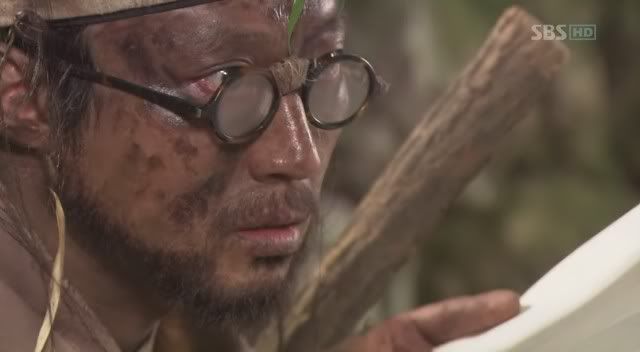 Part 6: Return to the Palace or Dan Won meet Yoon Book, Yoon Bok meet…w-w-wait, what?! DAN WON?!
Part 6: Return to the Palace or Dan Won meet Yoon Book, Yoon Bok meet…w-w-wait, what?! DAN WON?!The Dan Won’s negative history that’s known throughout the palace is told, however, all those who seem to know him personally do not think of this. What is it that he could have possibly done? It’s shown that it doesn’t take much to earn the higher-ups’ disdain. The Queen Grandmother does a good job of demonstrating that.
Yoon Bok and the Dan Won have similar personalities in the respect of sticking up for themselves. They have no problem of holding their own amongst their enemies and peers. However, I suppose they go about it differently. Hong Do is more of a joker while Yoon Bok is, in comparison, more serious. (I really love Park Shin Yang’s jokey laugh, it’s so funny).
They get off to a rocky start (and in the next episode, their student/mentor relationship, which works both ways, begins), but it’s not an irreparable kind of a rocky start. Rather, it’s much more like a first meeting that you have with a best friend, or someone close to you, and while you were annoyed as hell at the time, you look back after a while and laugh yourself to tears over the weird beginnings your relationship had.
Hong Do: Oi, you, bean!
Yoon Bok: Oh, it’s you, cheapskate!
Hong Do: Why are you coming out of the outhouse so happily? Did you pick up gold or something?
Yoon Bok: Do you have any idea how much I suffered that day? You ripped the painting with me and yet you just left by yourself, what was I supposed to do? Give me the 300 nyang!
Hong Do: Wow, this guy. It’s a great day and all he can talk about is the 300 nyang! What, did I rip that painting by myself?
Yoon Bok: No, that’s why I helped and recreated the painting! Give me the 300 nyang! 300 nyang, I say!
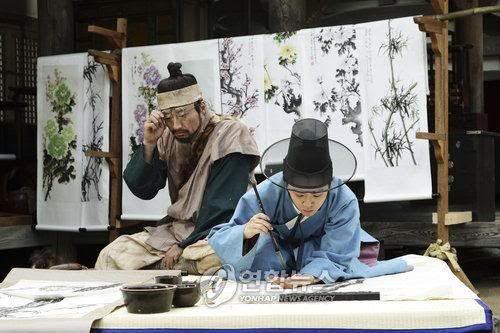 Overall Commentary
Overall Commentary
First things first: le difference en ageThis caused a lot of discussion on forums and blogs alike (more like “ewwwwww!”). Some people were kind of freaked about the old-enough-to-be-a-parent romance that was to happen, and lots of people still are, no doubt. But I think that it really takes the cake (I really like using that expression, don’t I?) when two actors who aren’t “supposed” to be a good match (at least physically) make it plausible, believable, real. When they make people say, “Wow! What’s going to happen with them next episode?” That’s when you know that the actors have done their jobs being their characters, not just acting.
It feels like there’s a culture gap, as this is a segeuk, between the actual series’ time period and us. If we don’t try to understand and close that culture gap, then we’ll continue to have more “ewwwww”s.
Second: The actors and actresses themselvesI think the casting for this drama is well done. Except for the gi-saeng Chung-hyang. I find her sageuk a little stuffy and stiff. She has the looks of a gi-saeng, but not enough of the sageuk characteristic in her speech, while she tries to go for it, it sounds too unnatural to be, well…natural. It feels like acting the character, not being the character for the audience. It wouldn’t hurt at all for her to step it up a notch.
Because it’s harder to evoke emotion about an ancient topic compared to current, trendy dramas casting for sageuks are well-done, unless you count (dare I say it?) Jang Geun Suk, blech. He is not made for sageuks at all.
Moon Geun Yung does gender-bent proud, she lowers her voice to sound like a boy, and she even has that sauntering walk. Park Shin Yang carries his own charm, and makes the character of Kim Hong Do real. I like his mannerisms a lot here, it breaks out the old sageuk mode that everyone’s used to seeing with stiff formalities and fake smiles beneath the political turmoil. I expected great stuff out of Park Shin Yang, of course, but Moon Geun Yung really surprised me with this project.
Third: SubtletiesSubtle things are nice to see; Hong Gil Dong lacked it, as do many, many other drama series. Like how Yoon Bok’s paint brush creates strokes in her world, not only on paper. The oh-so realistic expressions on Hong Do’s face, or the great little venom-filled conversations over tea that the King and his Grandmother share. All of these little things add to the big great things. Or when Yoon Bok finds herself alone, she lets herself revert back to a girl’s voice, sighing in happiness at the prospect of being by herself. Those things make it fun to watch, not just the plot itself.
Pros vs. ConsAlright. So, this show, as much as I’ve been gushing about it, isn’t perfect by any means. *laughs*
Pros * Moon Geun Yung and Park Shin Yang have nice chemistry, despite the unpopular age difference.
* A nice pace, doesn’t keep the plot dragging on forever.
* Great subtle details and acting isn’t fake or plastic by any means.
* Interesting plot, and it’s captivating.
* This sageuk has very little politics, and much about relationships.
* Great PD. Case in point: War of Money.
* Cinematography is great.
Cons * The soundtrack, while being stellar, kind of feels to be too much at times. I feel like I’m at a concert, not watching a drama.
* Sageuk vernacular, ‘nuf said. Unless you understand Korean history itself, it’s really hard, even as a Korean speaker, to understand just what is going on at times.
* Some subtleties are too vague for all the viewers to catch onto, things are very ambiguous to anyone who hasn’t been following the pre-airing synopsis-stuffs and previews. Lots of anonymous people and people who we don’t know what their connection really is.
* It has the possibility, like all dramas, to drag on too long over one plot point, or to lose its effective plot.
